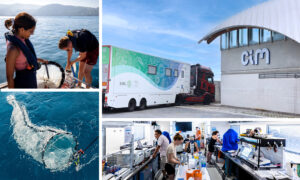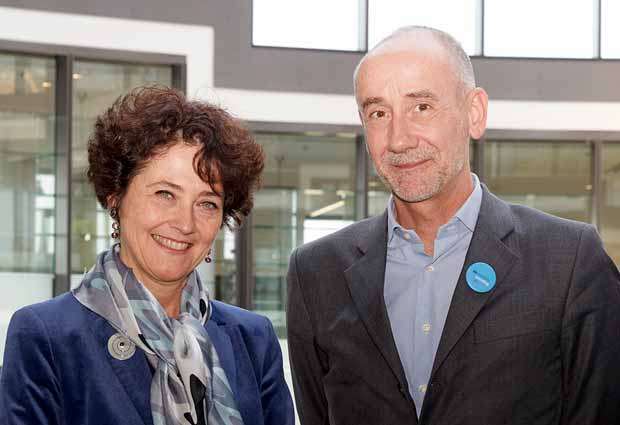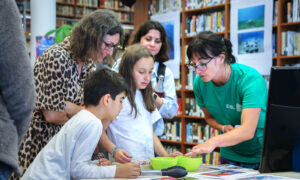
Diverse and united: Science in Europe
Edith Heard and Jean-Eric Paquet discuss the future of European science

Jean-Eric Paquet, Director General of Research and Innovation at the European Commission, recently visited EMBL to meet EMBL Director General Edith Heard and other senior EMBL faculty, and to tour EMBL’s labs and facilities. Discussions during the day covered topics such as interdisciplinarity, research infrastructures, and collaboration with industry. Here, Edith Heard and Jean-Eric Paquet reflect on the future of science in Europe, and on the key role that research and innovation must play.
What do you see as the priorities for European science in the next ten years?
Jean-Eric Paquet: European science remains outstanding, thanks in particular to the exceptional research infrastructure that exists here. The jewel in the European crown is the European Research Council, which really allows the best blue-sky research teams in Europe to work on challenging and new areas of science. That really gives a signal to the world that the best scientists come to do the best science in Europe. In the next ten years we need to nurture that, because we must continue to have this extraordinarily important basis for research and innovation.
Edith Heard: I think the way we see the future of science at EMBL is very much in line with the way the European Commission is thinking about European science, in terms of the research areas and interests that we need to focus on, and the idea that we need to encourage research to address some of the big societal challenges that impact both on human health and on the health of our planet. One of the key points that has come out of our discussions is that we must all work together to ensure that we’re doing science without frontiers, so that we can answer these big questions in a coordinated and united way.
Are science and innovation given the importance they deserve?
Jean-Eric Paquet: At the political level I think science and innovation are clearly identified as necessary to address key challenges in health, climate, food, transport, and energy, all of which will require new scientific knowledge and technological solutions. However, in my view there is not enough discussion between politicians and citizens on the importance of science. I was recently in Greece and was very impressed by the efforts of the Greek administration over the last three or four years to increase investment in research at a time of significant austerity. One of the ministers told me that a key ingredient of that policy choice was that citizens were involved in the discussion and agreed to prioritise research. Allocating more resources to science requires the support of taxpayers.
Edith Heard: I agree – I think engaging with citizens and having discussions that span every area of science and innovation is vital. I think it’s up to us as scientists, as organisations, to engage in that, but I also think it needs a more united voice across Europe that engages with the media and also reaches out to young people – I think schools and teachers are very important too. At EMBL we have the Science and Society programme, which is very much about bringing scientists and the public together, and this is something I really want to amplify in the next five years. For me it’s absolutely critical that the science we do is useful and interesting to society at large.
Should Europe be taking the lead on global issues like climate change?
Jean-Eric Paquet: Climate change is probably our single most difficult and pressing challenge, together with loss of biodiversity, which I think is often overlooked in public discussion. These should be combined with a discussion that is also taking place in Europe about creating more equal societies. Here again, research and innovation have many of the tools that will allow us to tackle these challenges, which will require deep transformations in our societies. The potential trade-offs are quite significant, and I believe that research and innovation allow us to deal with these trade-offs in a smarter way, hopefully providing more robust solutions with faster impact.
Edith Heard: In terms of EMBL’s missions we would really like to be able to bring not only the expertise and understanding, but also the tools and mechanisms to actually try to reverse some of the changes that are happening. If we could have an impact on methane levels or carbon emissions, that would be fantastic and I think that really is the kind of mission that we should be working towards. I think this is something we can achieve in Europe: our great strength is that we’re both diverse and united. There’s a lot of talent here.


